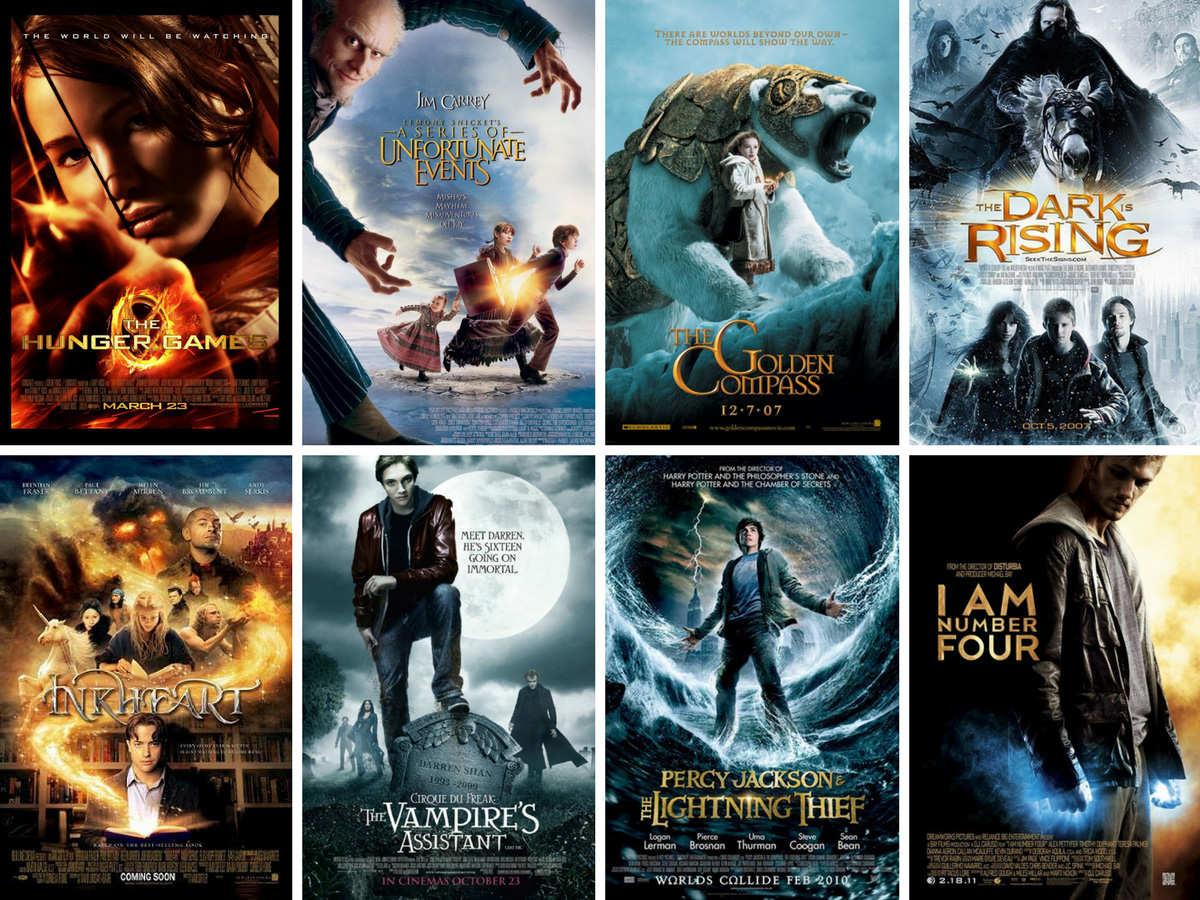I saw The Hunger Games in the cinema – it was enjoyable, with an interesting setting and characters and some social commentary, and certainly a lot better than Twilight – but it got me thinking about the success of film adaptations of best-selling genre book series. The sequel to The Hunger Games was greenlighted (greenlit?) practically the moment the film came out; the Twilight films, with which The Hunger Games shares some similarities, have had a certain inevitability to the sequels despite the lack of critical success (unlike The Hunger Games, which was well received by reviewers).
The winner in the adaptation of a book series into film is the Harry Potter series (and not just because I like them so much). It has made more money than God, there are theme parks and computer games and merchandise, not to mention critical acclaim and awards (albeit in the technical arena). The books were very popular, but the series hadn’t finished when the first film was started, so the adaptations weren’t guaranteed. There is also the distinguishing factor of the audience for the novels (and the films): the books are aimed at children (although adults, like myself, have also enjoyed them), whereas the Twilight series and The Hunger Games trilogy are aimed at young adults, with an emphasis on teenage girls, which is a completely different cinematic demographic. In many respects, the Harry Potter films are the ne plus ultra of adapting a book series, even the splitting of the final book into two films, and an outstanding achievement in many other respects. It is this model that has been so successfully employed with the Twilight films, and will presumably be used again for The Hunger Games.
(The other mega-successful adaptation of a fantasy book trilogy, The Lord Of The Rings, is slightly different in many respects – the books had been around for decades and the three films were made at the same time – so it doesn’t fit into this look at film adaptations of current book series.)
But what about the unsuccessful film adaptations of a series of fantasy books? What about the brave gambles of novels in to cinematic form in the hope of a franchise that failed at the first hurdle? In my search for genre entertainment, I’ve seen quite a few films that were adapted from best-selling books but never got the chance to make the sequels the filmmakers hoped for.
Lemony Snicket’s A Series Of Unfortunate Events (2004)
The popular books comprise a thirteen-volume series of children’s novels written by Lemony Snicket (pen name of Daniel Handler), first started in 1999, about three orphans and the cousin who tries to embezzle their inheritance. The film adapts the first three books, with Jim Carrey (back when he was a big star) as the evil cousin Count Olaf doing unpleasant things; it also has Meryl Streep, Timothy Spall, Billy Connolly, narration by Jude Law and a cameo from Dustin Hoffman, so big things expected to get people involved. It made $209 million in the US (from a budget of $140 million), so at least it was profitable, and it was made with the hopes of it being a franchise, but nothing has happened since; the best that can be said was that it was at least a visually interesting and different film in its own right.
The Golden Compass (2007)
This film was based on the excellent His Dark Materials trilogy by Philip Pullman, and was made with some famous names: Daniel Craig, Nicole Kidman, Eva Green, the voices of Ian McKellen, Ian McShane, Kathy Bates, Kristin Scott Thomas. It was directed by Chris Weitz (he was the first director, then resigned due to the challenge, was replaced by Anaud Tucker, who then resigned and Weitz came back and adapted the book himself), who went on to direct Twilight: New Moon after this. Unfortunately, I thought it wasn’t very good, and a lot of other people agreed: with an estimated budget of $180 million, it grossed an estimated US box office of $70 million (although it did $300 million worldwide). The money was needed for CGI: children’s souls are animals that can change shape, it’s set in an alternative world, one of main supporting characters is a talking polar bear (who has fight with another polar bear), and there are witches flying on broomsticks in an aerial battle. It ends with a conclusion to the main thrust of the movie but it is obvious that there is supposed to be more, which would have been difficult to see how they would have worked when the first film eviscerated the anti-religion aspect of the novel for the sake of presumed box office. The best thing about the film, apart from the CGI, was that Kidman was perfect as the icy Mrs Coulter.
The Seeker: The Dark Is Rising (2007)
This is the most disappointing entry on this list of film adaptations (as I complained about previously); it is based on the second book in The Dark Is Rising cycle by Susan Cooper, a five-volume contemporary fantasy series written in the 1970s and aimed at young adults (and a series I loved when I discovered it as a teenager). The film doesn’t have so many famous faces (Christopher Eccleston, Ian McShane, the lead is Alexander Ludwig, before he was in The Hunger Games), and it doesn’t have a big name director. The problem was in the screenplay by John Hodge (writer of Trainspotting and others), which goes out of its way to differentiate the story from Harry Potter (both have boys who discover they have magical powers, aided by an elder mentor figure, involved in a larger war) and thus entirely miss the point of the book; it makes the family American despite the English setting (although it was filmed in Romania), and even introduces the ridiculous notion of a twin brother to the story. At least it didn’t waste too much money: it had an estimated budget of $20 million, making less than $9 million in the US.
Inkheart (2008)
This little film didn’t work, unfortunately (in my humble opinion), because I really liked the idea of the book, about people who can read book characters to life. It is based on the first book in the young adult fantasy Inkworld trilogy by Cornelia Funke, written in 2003 (with the sequels in 2005 and 2007), and starred some famous names: Brendan Fraser (the author’s inspiration for the main character), Paul Bettany, Helen Mirren, Andy Serkis, Jim Broadbent in a small role. Despite an estimated budget of $60 million and a worldwide gross of $57 million, there is supposedly a film sequel, Inkspell (presumably based on the book of the same name), due in 2013.
Cirque Du Freak: The Vampire’s Assistant (2009)
Based on a series of books, The Saga of Darren Shan, by Darren Shan (the pen name of Irish author Darren O’Shaughnessy), containing 12 books that were started in 2000. The film was based on the first three books, and has some famous names: John C Reilly, Salma Hayek, Willem Dafoe, Josh Hutcherson (before The Hunger Games), Ken Watanabe, Jane Krakowski. The story has vampires (who are again different from the usual portrayal) and teenagers in it, but it’s nothing like Twilight; the lead character is also quite annoying, which doesn’t help, and the film wasn’t very good (according to me, at least). It was directed by Paul Weitz (the brother of Chris), so you can keep the blame in the family if you were looking for failure of film adaptations of genre book series. It has an ending of sorts but it is obvious that there is more going on (for example, the war between the vampires begins at the end of the film), but an estimated gross of under $14 million from an estimated budget of $40 million meant that no sequels were going to happen.
Percy Jackson and the Lightning Thief (2010)
Also known as ‘Chris Columbus tries to make Harry Potter as an American film’, due to the similarities between the two (and Columbus directed both). It was loosely based on the first novel in the adventure fantasy five-book Percy Jackson & The Olympians series written by Rick Riordan, set in modern times but based on Greek mythology, about a demigod called Percy and his adventures. The leads are unknowns but the rest of the cast is starry: Pierce Brosnan, Sean Bean, Steve Coogan, Rosario Dawson, Catherine Keener, Uma Thurman. Apart from the Harry Potter comparisons, there is a lot to enjoy in the updating of Greek mythology (well, I thought so), and it doesn’t have a romance as the main focal point (although there is a boyfriend/girlfriend dynamic involved), and it looks like there will be some more: an estimated gross of $225 million worldwide from an estimated budget of $95 million means that there is a sequel scheduled for 2013.
I Am Number Four (2011)
This film is based on the first book, published in 2010, in the young adult science fiction Lorien Legacies series, written by Pittacus Lore (pseudonym of James Frey and Jobie Hughes). The biggest name is Timothy Olyphant (a last-minute replacement for Sharlto Copley) and stars Alex Pettyfer in the lead (he had been the lead in Stormbreaker, the British attempt at a ‘film adaptation of a book series’ franchise, based on the Alex Rider series by Anthony Horowitz about the teenage spy). It is about aliens living on Earth hiding from other aliens who are trying to kill them; the protagonist alien is a teenage boy who has superpowers but falls for a human girl he goes to school with (he and is protector, Olyphant, are in hiding); fortunately, the superpowers get used eventually. The film was set up to be a franchise, with an ending clearly open for the sequels and the Twilight-like love story of an alien boy and a human girl that makes the middle section drag (the final third with all the super-powered action is quite entertaining). With an estimated budget of $50 million grossing and estimated $55 million in the US, a sequel doesn’t look likely.
Footnotes
The Chronicles of Narnia: The Lion, The Witch And The Wardrobe (2005), The Chronicles of Narnia: Prince Caspian (2008), and The Chronicles of Narnia: The Voyage Of The Dawn Treader (2010) are not included in this list because they haven’t finished the entire series (if they ever will; Disney pulled out of funding of third film because it wasn’t making enough money).
Jumper (2008) is based on novel from 1992, and there was a sequel novel, but that was in 2004, so it can’t really be called a series, even though the film was set up to have sequels, and because the film changed subsequently from book (e.g. the Paladins introduced in the film are not in the book).
The Spiderwick Chronicles (2008) is a very good film adaptation of the five-book The Spiderwick Chronicles series, children’s books by Tony DiTerlizzi and Holly Black, but is all books (except the fourth, and changing some things) in one film so it doesn’t fit the pattern.
I haven’t included the adaptation of comic book superheroes because they are not specific adaptations but of the character themselves using various stories from their history, and I haven’t included Tintin because there has been only one film and that adapted two of the books in one go (as well as little bits from other books).
There is also Eragon, but I really don’t want to talk about that awful, awful film.




